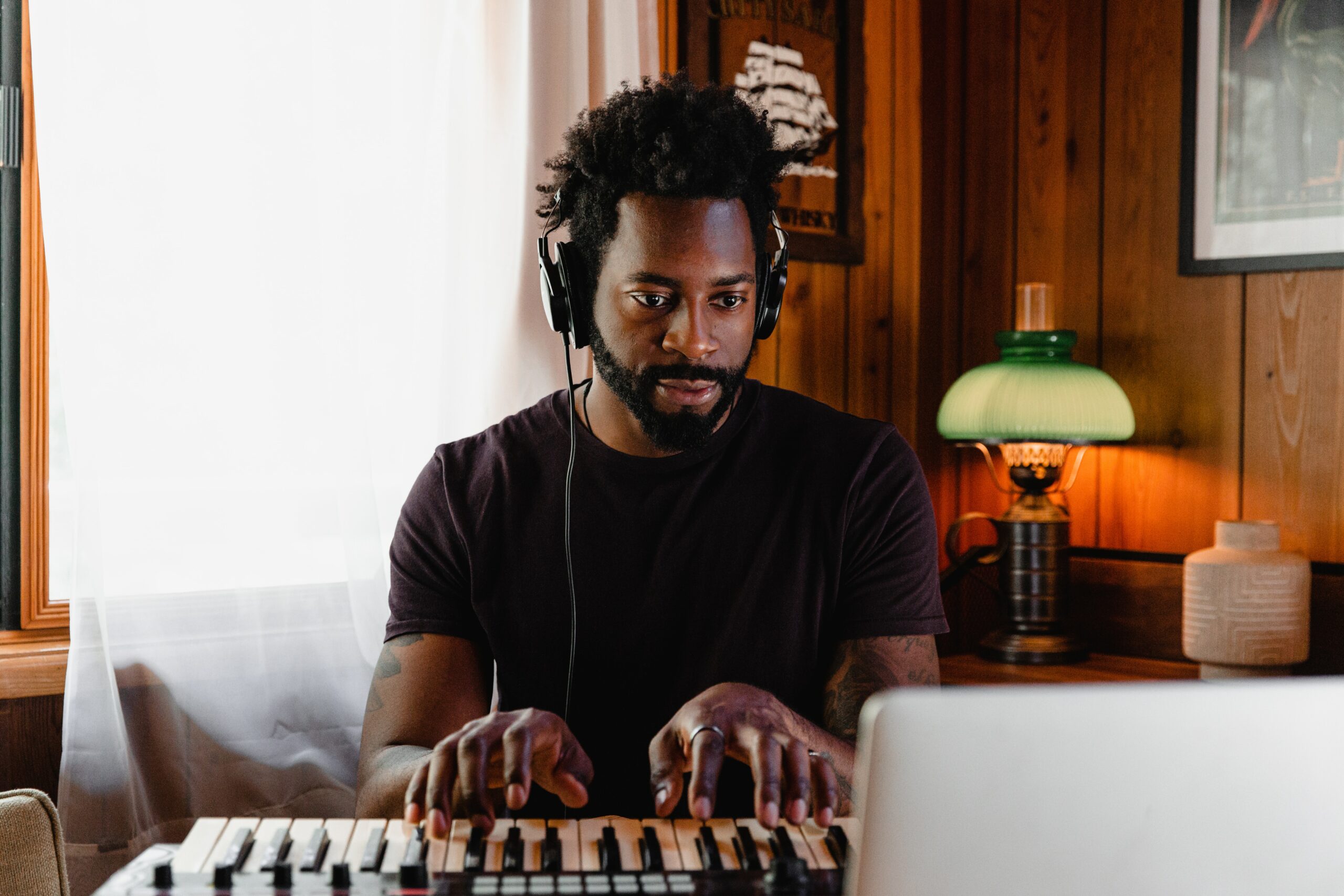Are you a piano virtuoso or a music enthusiast looking to share your passion for playing piano with the world? There is no better and more convenient way to earn some extra income than by being able to share your expertise with the world – and online teaching has made that possible!
Teaching piano online can be a rewarding and flexible way to help others learn an instrument. In this comprehensive guide, we’ll explore all of the necessary steps you need to excel in the world of online piano instruction, from setting up your virtual music studio to engaging your future pianists effectively.
Follow along or skip ahead:
- Why should you teach piano online?
- Can you make a living from teaching piano online?
- Qualifications needed to teach piano online
- Steps to creating your online piano learning experience
- Use technology to your advantage
- Extra tips to consider
- Final thoughts
Related: How To Teach Guitar Online (Ultimate Guide)
Why should you teach piano online?
The global online music industry is rapidly growing, and online music instruction is in demand now more than ever before.
This may come as a surprise to some people, but online music lessons work basically the exact same way as in-person lessons do, just with added flexibility and convenience. There is a structured approach to building your musical foundation and key theoretical concepts, and then new lessons are implemented to build on those. With online piano instruction, lessons typically come in easy-to-digest segments that continue to expand students’ knowledge in small increments.
These are some pros and cons of piano lessons in person versus online:
| Teaching piano | Pros | Cons |
| In person |
|
|
| Online |
|
|
Teaching piano online offers quality piano education to aspiring pianists, regardless of their location. Educators are able to connect with students from all over the world. It also offers music teachers the flexibility to work full-time, part-time, or as a side gig, making it ideal for those who prefer non-traditional work hours or have other commitments.
Online piano instruction also allows you to serve students with diverse learning needs. You can provide supplementary materials, video demonstrations, or interactive practice exercises to help learners of all levels, from beginners to advanced pianists.
Teaching piano online is also a great idea for any pianists who are also aspiring entrepreneurs. With online piano instruction, you are able to develop your own piano courses, create music content, and even build your brand in the online music education space. You can also expand your offerings by selling digital products or memberships for recurring revenue.
Can you make a living from teaching piano online?
You can absolutely earn a good income from teaching piano online. In order to be the best online piano teacher out there, here are some things you can do to set yourself apart from your competitors:
- Determine your specialty – Choose the specific areas of piano instruction you want to offer. You could focus on beginner piano, intermediate piano, advanced techniques, music theory, or specialized genres like jazz or classical.
- Price your services competitively – Set your rates for your piano lessons, and look at what other online teachers in the market are charging. Consider factors like your qualifications, the level of piano instruction you’re offering, and the demand for your services.
- Market yourself – Promote your online piano teaching services through social media, music forums, and relevant websites. Consider creating a content marketing strategy, offering free piano webinars or tutorials, and leveraging email marketing to reach potential students.
- Showcase testimonials – Word of mouth goes a long way in the music industry. As you gain experience and positive reviews, create a portfolio showcasing your successes and testimonials from satisfied piano students. This builds trust with potential clients and sets yourself apart as a reputable music educator.
Related: The Best Online Teaching Platforms to Earn Money in 2023
Qualifications needed to teach piano online
Besides a passion for instrumental music, to teach piano online effectively, you should have:
- The skills and ability to play the piano well, as you will be providing demos for your students
- A strong understanding of piano techniques, including the specific areas or styles you plan to teach.
- Ideally, a degree in music or a related field, or significant experience as a pianist. It is common for piano teachers to have a certificate and be accredited from the The Royal Conservatory of Music (RCM). However, practical expertise and a passion for music can also be valuable.
- Confidence and comfort with technology, as you’ll need to create and deliver online piano lessons efficiently.
It’s important for your reputation as a music teacher to meet the necessary qualifications and expertise required to teach your chosen level and theory of piano. A strong background in music, a degree, and significant experience can enhance your credibility.
Related: Best Equipment & Software For Creating Online Courses
Steps to creating your online piano learning experience
Once you decide that you’re ready to venture into the world of online music instruction, it’s time for the exciting part – creating your online piano learning experience and setting up your virtual classroom.
Select an online platform
You have a few options for teaching piano online. Decide whether you want to work through an existing online music education platform, use your own website, or work with a combination of both.
If you would like more control and flexibility with your teaching, choosing an online platform can give you this freedom. This allows you the ability to design your content and teach it the way you’d like.
Selecting a platform that offers an all-in-one solution will give you access to design tools, asynchronous and synchronous video recording, community features, assignment and certification options, and course evaluation features that will make all the difference when you’re setting up your online learning platform. Also consider elements such as payment integrations, analytic reports, and what the platform offers in terms of data protection and technological support.
Thinkific is a platform that provides extensive support and resources, ensuring you have everything you need to launch and grow your online piano teaching business.
Prepare your virtual music studio
Creating an effective online piano learning environment is crucial. Organize your online space so that when you’re with students, you don’t have to worry about the logistics of online teaching.
- Equipment and setup – Along with your piano, ensure that you have reliable equipment to live-stream and record your lessons. This includes a good microphone, webcam, and a stable internet connection for clear communication. Designate a dedicated, well-lit teaching space in your home that is quiet and conducive to music.
- Organize teaching materials – Gather and organize your piano materials, including sheet music, music theory books, and digital resources, in an easily accessible format. Cloud storage services like Google Drive or Dropbox can help store and share these materials efficiently.
- Scheduling and lesson delivery – Establish a consistent schedule for online piano lessons and communicate it clearly to your students. Provide structure and predictability to encourage punctuality and active participation.
- Recognize potential challenges – Acknowledge potential challenges students may encounter in an online music learning environment. Offer guidance on technical issues, provide alternative practice resources, and ensure your materials are accessible to all students, including those with disabilities.
Plan your lessons
Designing well-structured piano lessons is an essential part of online teaching. Take these tips into consideration when planning your lessons:
- Define your objectives – Clearly outline your teaching goals and objectives for each piano lesson or course to keep your instruction focused.
- Break it down – Divide music concepts and techniques into manageable segments, making it easier for students to grasp complex piano skills gradually.
- Create engaging content – Develop interactive piano exercises, practice routines, and assignments that promote active learning and musical creativity.
- Implement assessments and homework – Use regular assessments, practice assignments, and give out regular homework to help your students improve their skills.
Related: The Most Common Barriers to Learning – And How to Overcome Them
Engage your students
When piano students are engaged, they will be more motivated and eager to practice their lessons. Finding interesting and fun ways to engage your piano students online will help them feel more inspired to excel in the musical world. It will also help nurture a healthy and respectful teacher-student relationship.
Teaching students online may require a bit more effort than in-person instruction to make sure that your students’ full attention is directed towards their learning. To engage your online piano students, focus on having interactive lessons where students are encouraged to ask questions, play along, and explore musical ideas. Also try using visuals like sheet music, musical notation, and videos to enhance piano instruction and illustrate musical concepts effectively.
Another way to make sure your online piano students are fully engaged is to regularly assess their progress and provide feedback on their practice exercises and performance recordings. This feedback will help students’ refine their technical skills and musical interpretation. Offer periodic musical evaluations or examinations to assess students’ proficiency in piano techniques and musical interpretation. You can also create activities and exercises for students to reflect on their musical progress and set goals.
Equally as important is celebrating musical achievements – incorporate fun ways to acknowledge students’ musical achievements to boost their motivation and confidence.
Adapt and improve
If you’re used to teaching piano in-person, it could take some getting used to switching to an online music studio or classroom… Just remember that online piano teaching is an evolving process.
Continuously adapt and enhance your methods:
- Gather feedback – Ask your students for feedback on your teaching style, lesson materials, and musical experiences. Be open to making musical adjustments based on their input and changing musical trends.
- Professional development – Stay updated with the latest musical trends, teaching tools, and methodologies by participating in online music courses, workshops, and musical seminars.
- Stay patient and flexible – Understand that students learn at their own pace. Adapt your teaching approach to accommodate different musical learning styles and goals.
- Promote effective communication – Ensure your musical instructions, explanations, and expectations are communicated clearly to avoid misunderstandings. This includes keeping your students informed about musical lesson schedules, practice assignments, and any changes that may arise.
Foster a musical community
With any form of online learning, it’s critical to build a sense of community, as this helps enhance motivation and musical engagement.
Start your online piano lessons with icebreaker activities to help students feel more comfortable with learning how to play an instrument online. You can even incorporate collaborative musical projects that encourage students to perform together, even in a virtual music environment.
Performing is a huge part of playing an instrument. Organize occasional virtual music recitals, where students can showcase their musical talents and celebrate their musical progress together.
Use technology to your advantage
The great thing about teaching piano online is that you can use technology to your advantage. You can enhance your online piano teaching by leveraging these tools:
- Virtual keyboard tools – Explore virtual keyboard tools that allow students to practice and visualize piano fingerings and musical notation.
- Online sheet music libraries – Provide students with access to online sheet music libraries and music notation software to provide students with extra practice.
- Video and audio recording – Encourage students to record their musical performances and share them for feedback and assessment.
- Gamification techniques – Implement rewards and gamification methods to make learning how to play the piano fun for all ages.
Extra tips to consider
Teaching piano online is a creative endeavor that you can personalize and add your own style to. Every teacher will have their own rhythm and groove, and providing a unique learning environment is what makes students want to learn from certain teachers.
These are some extra tips to take into consideration when designing your online piano lesson plan:
- Time management – Help your students manage their practice time effectively by providing guidance on creating practice routines and setting realistic goals for learning piano.
- Encourage musical creativity – Promote musical creativity by encouraging students to compose their music, arrange music pieces, or explore different musical genres.
- Create a musical resource library – Build a library of supplementary musical resources including musical theory guides, performance tips, and reference materials to support your students’ musical learning journey.
Final thoughts
The world of online piano instruction is growing, and more students find it easier and more convenient to learn from online teachers.
Follow the tips and strategies in this blog to find your own online teaching style and create an effective musical learning experience for your piano students.
Enjoy the fulfilling journey of teaching piano online!





